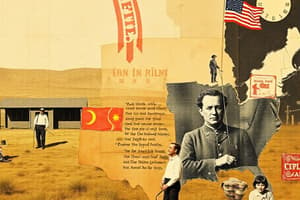Podcast
Questions and Answers
What primary economic factors motivated individuals to head westward during the expansion?
What primary economic factors motivated individuals to head westward during the expansion?
- Search for land, resources, and economic opportunities (correct)
- Escape from religious persecution
- Desire for adventure and exploration
- Political influences from the East
What aspect of Romanticism inspired people to migrate to the west?
What aspect of Romanticism inspired people to migrate to the west?
- Focus on industrial progress
- Emphasis on community and social living
- Idealization of nature and individualism (correct)
- Promotion of urban expansion
What was the position of the Democratic Party regarding westward expansion during this time?
What was the position of the Democratic Party regarding westward expansion during this time?
- They were indifferent to the issue
- They supported expansion (correct)
- They wanted to halt all expansion efforts
- They opposed it due to moral concerns
What was the Wilmot Proviso and why was it significant?
What was the Wilmot Proviso and why was it significant?
How did the Fugitive Slave Act of 1850 impact Northern attitudes toward slavery?
How did the Fugitive Slave Act of 1850 impact Northern attitudes toward slavery?
What led to the violence known as 'Bleeding Kansas'?
What led to the violence known as 'Bleeding Kansas'?
What action did Henry David Thoreau take to protest the Mexican-American War?
What action did Henry David Thoreau take to protest the Mexican-American War?
What justification did Abraham Lincoln provide through his 'spot resolutions' regarding the Mexican-American War?
What justification did Abraham Lincoln provide through his 'spot resolutions' regarding the Mexican-American War?
What argument did the chief justice present regarding African Americans and slavery?
What argument did the chief justice present regarding African Americans and slavery?
What was a primary objective of the Republican Party formed in the 1850s?
What was a primary objective of the Republican Party formed in the 1850s?
Which candidate in the 1860 presidential election supported the expansion of slavery?
Which candidate in the 1860 presidential election supported the expansion of slavery?
What historical strategy did the Missouri Compromise and Compromise of 1850 reflect?
What historical strategy did the Missouri Compromise and Compromise of 1850 reflect?
How did the Caning of Charles Sumner affect national politics?
How did the Caning of Charles Sumner affect national politics?
What was a significant consequence of Lincoln's election in 1860?
What was a significant consequence of Lincoln's election in 1860?
What motivated Union soldiers during the Civil War?
What motivated Union soldiers during the Civil War?
What was the purpose of the Emancipation Proclamation?
What was the purpose of the Emancipation Proclamation?
What did the term 'hard war' refer to in the context of the Civil War?
What did the term 'hard war' refer to in the context of the Civil War?
What was Andrew Johnson's plan for Reconstruction generally characterized as?
What was Andrew Johnson's plan for Reconstruction generally characterized as?
What were 'Black Codes' designed to do?
What were 'Black Codes' designed to do?
Which act led to the impeachment of President Johnson?
Which act led to the impeachment of President Johnson?
How was the winner of the 1876 election determined amidst controversies?
How was the winner of the 1876 election determined amidst controversies?
Flashcards
Wilmot Proviso
Wilmot Proviso
A proposal to ban slavery in lands acquired from Mexico.
Compromise of 1850
Compromise of 1850
A set of laws addressing slavery in newly acquired territories.
Fugitive Slave Act
Fugitive Slave Act
Law requiring the return of runaway slaves to their owners.
Popular Sovereignty
Popular Sovereignty
Signup and view all the flashcards
Bleeding Kansas
Bleeding Kansas
Signup and view all the flashcards
Dred Scott case
Dred Scott case
Signup and view all the flashcards
Mexican-American War causes
Mexican-American War causes
Signup and view all the flashcards
Polk's Election impact
Polk's Election impact
Signup and view all the flashcards
Abolitionists vs. Anti-slavery
Abolitionists vs. Anti-slavery
Signup and view all the flashcards
1860 Presidential Candidates' views
1860 Presidential Candidates' views
Signup and view all the flashcards
Pre-Civil War Slavery Compromise
Pre-Civil War Slavery Compromise
Signup and view all the flashcards
Caning of Charles Sumner
Caning of Charles Sumner
Signup and view all the flashcards
Lincoln's Election & Secession
Lincoln's Election & Secession
Signup and view all the flashcards
Confederate/Union Soldier Motives
Confederate/Union Soldier Motives
Signup and view all the flashcards
Emancipation Proclamation Scope
Emancipation Proclamation Scope
Signup and view all the flashcards
Lincoln's View of the Confederacy
Lincoln's View of the Confederacy
Signup and view all the flashcards
"Hard War"
"Hard War"
Signup and view all the flashcards
Union Military Advantages
Union Military Advantages
Signup and view all the flashcards
Reconstruction Plan Differences
Reconstruction Plan Differences
Signup and view all the flashcards
Freedmen's Bureau
Freedmen's Bureau
Signup and view all the flashcards
Black Codes
Black Codes
Signup and view all the flashcards
Tenure of Office Act
Tenure of Office Act
Signup and view all the flashcards
1876 Election Dispute
1876 Election Dispute
Signup and view all the flashcards
Study Notes
Westward Expansion and Manifest Destiny
- Economic factors drove westward expansion, including the search for land, resources, and opportunities (farming, mining).
- Romanticism's emphasis on nature and individualism fueled the westward migration ideal.
- The Democratic Party supported expansion; the Whigs were more cautious or opposed.
- James K. Polk's 1844 election victory promoted Texan annexation and expansion into Oregon and California.
- The Mexican-American War stemmed from border disputes, expansionist desires, and Mexican refusal to negotiate.
- Abraham Lincoln's "spot resolutions" reflected opposition to the war, questioning its justification.
- Henry David Thoreau protested the war by refusing to pay taxes.
Slavery and Sectionalism (1850s-1860s)
- The Wilmot Proviso aimed to ban slavery in Mexican territories, deepening sectional tensions.
- The Compromise of 1850 addressed California statehood, a stricter Fugitive Slave Act, and popular sovereignty.
- The Fugitive Slave Act forced Northerners to return runaway slaves, strengthening anti-slavery sentiment.
- Southern Californians opposed Californian statehood to avoid weakening Southern political power.
- The Kansas-Nebraska Act allowed residents to decide on slavery through popular sovereignty, causing conflict.
- "Popular sovereignty" was the principle of allowing settlers to decide on slavery locally.
- "Bleeding Kansas" was violent conflict over slavery, including John Brown’s involvement.
- John Brown's raid on Harper's Ferry aimed to incite a slave rebellion.
- The Dred Scott decision ruled enslaved people were not citizens and Congress couldn't ban slavery in territories.
- Abolitionists sought complete slavery abolition; Free Soilers opposed its expansion but didn't necessarily call for its end.
- Political parties changed; Whigs dissolved, and Republicans arose against slavery expansion.
- 1860 presidential candidates held differing views on slavery and Union preservation. (Lincoln opposed expansion, Douglas supported popular sovereignty, Breckenridge supported expansion, and Bell sought Union preservation.)
- The pre-Civil War approach to slavery prioritized compromises to resolve tensions, like the Missouri and 1850 compromises.
- The Caning of Charles Sumner escalated sectional tensions and impacted the 1856 election.
Civil War
- Lincoln's 1860 election triggered Southern secession due to fears concerning slavery's future.
- Southern secession leaders justified it by upholding states' rights and maintaining slavery.
- Union and Confederate soldiers fought for honor, duty, and home protection; but Union soldiers also fought to preserve the Union, while Confederates aimed to protect states' rights and slavery.
- Black men in the North fought for freedom and equality through military service.
- The Emancipation Proclamation freed Confederate enslaved people, partly excluding border states to maintain loyalty.
- President Lincoln viewed the Confederacy as a rebellious part of the Union and refused to acknowledge it as a separate country.
- "Hard war" tactics emphasized total destruction of Confederate resources, leading to civilian suffering but aiming to end the conflict quickly.
- The Union held advantages in resources and manpower; the Confederacy possessed superior military leadership and local knowledge.
Reconstruction
- Lincoln proposed a lenient reconstruction process to reintegrate the South.
- Radical Republicans advocated for harsher punishments.
- Johnson's plan resembled Lincoln's but prioritized Southern autonomy.
- The Freedmen's Bureau offered crucial support to freed slaves through education, healthcare, and legal aid.
- Andrew Johnson's different background, a Southern Democrat and former slaveholder, contrasted with Lincoln's more moderate, nationally focused approach.
- "Black Codes" restricted African American rights, promoting forced labor and limiting freedoms.
- The Tenure of Office Act, restricting presidential removal power, was connected to Johnson's impeachment.
- The contested 1876 election outcome determined by an electoral commission illustrated widespread voter fraud.
Studying That Suits You
Use AI to generate personalized quizzes and flashcards to suit your learning preferences.



